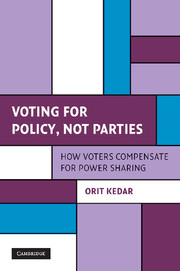
-
Select format
-
- Publisher:
- Cambridge University Press
- Publication date:
- January 2010
- December 2009
- ISBN:
- 9780511657481
- 9780521764575
- 9781107617919
- Dimensions:
- (228 x 152 mm)
- Weight & Pages:
- 0.48kg, 238 Pages
- Dimensions:
- (229 x 152 mm)
- Weight & Pages:
- 0.36kg, 240 Pages
You may already have access via personal or institutional login
Book description
This book proposes an institutionally embedded framework for analyzing voter choice. Voters, Orit Kedar argues, are concerned with policy, and therefore their vote reflects the path set by political institutions leading from votes to policy. Under this framework, the more institutional mechanisms facilitating post-electoral compromise are built into the political process (e.g., multi-party government), the more voters compensate for the dilution of their vote. This simple but overlooked principle allows Kedar to explain a broad array of seemingly unrelated electoral regularities and offer a unified framework of analysis, which she terms compensatory vote. Kedar develops the compensatory logic in three electoral arenas: parliamentary, presidential, and federal. Leveraging on institutional variation in the degree of power sharing, she analyzes voter choice, conducting an empirical analysis that brings together institutional and behavioral data in a broad cross section of elections in democracies.
Contents
Metrics
Altmetric attention score
Full text views
Full text views help Loading metrics...
Loading metrics...
* Views captured on Cambridge Core between #date#. This data will be updated every 24 hours.
Usage data cannot currently be displayed.
Accessibility standard: Unknown
Why this information is here
This section outlines the accessibility features of this content - including support for screen readers, full keyboard navigation and high-contrast display options. This may not be relevant for you.
Accessibility Information
Accessibility compliance for the PDF of this book is currently unknown and may be updated in the future.

